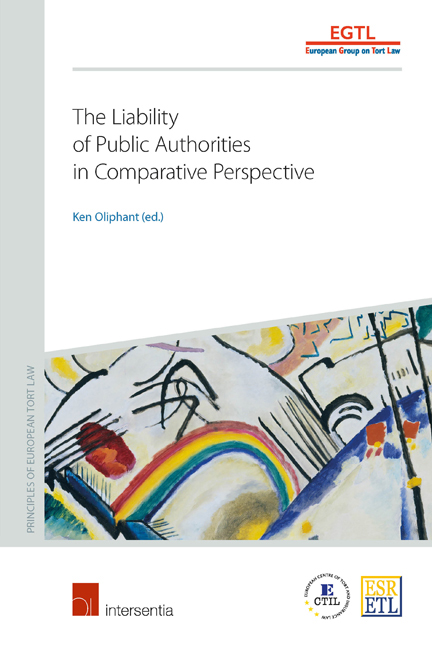Book contents
- Frontmatter
- Preface
- Contents
- List of Authors
- Introduction
- Questionnaire
- PART I PUBLIC AUTHORITY LIABILITY OUTLINED
- Austria
- Belgium
- Czech Republic
- Denmark
- England and Wales
- France
- Germany
- Greece
- Israel
- Italy
- The Netherlands
- Norway
- Poland
- Portugal
- South Africa
- Spain
- Switzerland
- The United States
- European Union
- The Liability of Public Authorities: an Economic Analysis
- PART II CASE STUDIES
- PART III CONCLUSIONS
The Liability of Public Authorities: an Economic Analysis
from PART I - PUBLIC AUTHORITY LIABILITY OUTLINED
Published online by Cambridge University Press: 27 November 2017
- Frontmatter
- Preface
- Contents
- List of Authors
- Introduction
- Questionnaire
- PART I PUBLIC AUTHORITY LIABILITY OUTLINED
- Austria
- Belgium
- Czech Republic
- Denmark
- England and Wales
- France
- Germany
- Greece
- Israel
- Italy
- The Netherlands
- Norway
- Poland
- Portugal
- South Africa
- Spain
- Switzerland
- The United States
- European Union
- The Liability of Public Authorities: an Economic Analysis
- PART II CASE STUDIES
- PART III CONCLUSIONS
Summary
INTRODUCTION
Traditional economic analysis of accident law has largely focused on individual utility maximising actors as potential injurers and potential victims. On that basis a huge literature has been developed since the early publications of Calabresi in the 1960s explaining under which conditions particular liability rules may be effective in promoting social welfare. Moreover, the theoretical assumptions made in the literature have increasingly been met with empirical support as well. However, less attention was paid to the situation where the tortfeasor was not an individual actor or commercial enterprise, but a public authority or the State. Only during the recent years have a few articles exploring public authority liability been published, some of them focusing specifically on the liability of the State in public international law, asking for example to what extent States have incentives to comply with international conventions and more recently also applying economic analysis to the case where a public authority is a tortfeasor in a more ordinary (domestic) tort case. However, the literature is still relatively recent and has perhaps not produced such clear conclusions as in the case of economic analysis of accidents generally. The goal of our contribution is to provide some insights on this literature and of course, where possible, to deepen and elaborate on this literature. This may be helpful since, to some extent, the literature may have a rather abstract character and may thus be less linked to specific problems that lawyers are dealing with when referring to public authority liability.
Our contribution is inevitably limited to an economic analysis and will hence not focus on legal issues which will be the core subject of other contributions to this volume. However, to some extent the economic literature also provides examples from various jurisdictions (often the US). These examples (and cases) will sometimes be discussed since they can provide useful illustrations of the economic reasoning.
The economic literature so far has mostly addressed public authority liability in a rather broad sense, assuming the public authority would be liable for behaviour (acts or omissions) of civil servants acting on behalf of the public authority. Fewer distinctions are made between the various public authorities on which liability could be imposed (eg local communities, provinces or states).
- Type
- Chapter
- Information
- The Liability of Public Authorities in Comparative Perspective , pp. 587 - 618Publisher: IntersentiaPrint publication year: 2016



